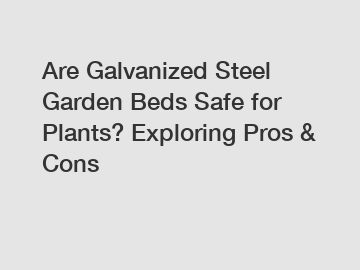Are Galvanized Steel Garden Beds Safe for Plants? Exploring Pros & Cons
Are Galvanized Steel Garden Beds Safe for Plants? Exploring Pros & Cons.
Galvanized steel garden beds have gained popularity among gardening enthusiasts in recent years. These raised beds offer several advantages over traditional wooden or plastic beds, but concerns have been raised about their safety for plants. In this article, we will explore the pros and cons of galvanized steel garden beds and analyze whether they are indeed safe for plants.
1. Pros of Galvanized Steel Garden Beds:

a. Durability: One of the biggest advantages of galvanized steel garden beds is their durability. Unlike wooden beds that can rot or warp over time, galvanized steel beds can withstand harsh weather conditions. They are resistant to corrosion, making them a long-lasting option for your garden.
b. Pest and Weed Control: Galvanized steel garden beds provide a barrier against pests such as slugs and snails, preventing them from reaching your plants. This can be particularly beneficial for those struggling with pest infestations. Additionally, the raised design of these beds reduces weed growth, making maintenance easier.
2. Cons of Galvanized Steel Garden Beds:
a. Chemical Concerns: The process of galvanization involves coating steel with a layer of zinc to prevent rusting. However, some gardeners worry that the zinc may leach into the soil and harm their plants. High levels of zinc can be toxic to certain plant species, affecting their growth and overall health.
b. pH Imbalance: Another concern regarding galvanized steel beds is the potential for pH imbalance in the soil. Zinc can raise the pH level, making it more alkaline. This can be undesirable for plants that require slightly acidic soil. Regular testing and appropriate amendments, such as adding organic matter, can help maintain the optimal pH level.
3. Assessing Safety for Plants:
To determine whether galvanized steel garden beds are safe for plants, it is crucial to consider a few factors:
a. Zinc Content: While zinc can be harmful at high levels, the actual amount that leaches into the soil from galvanized steel beds is generally minimal. Numerous studies have shown that zinc concentrations in soil near galvanized steel beds are within safe limits for most plants.
b. Plant Selection: Some plant species may be more sensitive to zinc than others. If you plan to grow zinc-sensitive plants, it may be safer to opt for alternative garden bed materials. However, most common garden vegetables and flowers are tolerant of the zinc levels typically found in galvanized steel beds.
c. Maintenance: Regular maintenance plays a crucial role in ensuring the safety of plants in galvanized steel garden beds. Conducting pH tests, adjusting soil acidity, and using compost or organic matter can help mitigate any potential issues.
In conclusion, galvanized steel garden beds offer numerous advantages for gardeners, including durability and pest control. While concerns exist about the potential leaching of zinc into the soil, scientific studies suggest that the levels are generally safe for most plants. Assessing the specific needs of your chosen plants and implementing appropriate maintenance practices will further mitigate any potential risks. Ultimately, considering the pros and cons, galvanized steel garden beds can indeed be safe and beneficial for plant growth, especially for those who prioritize long-lasting and low-maintenance gardening options.
Contact us to discuss your requirements of galvanized hog wire fence, stainless steel security mesh, curved welded wire mesh fence. Our experienced sales team can help you identify the options that best suit your needs.

Comments